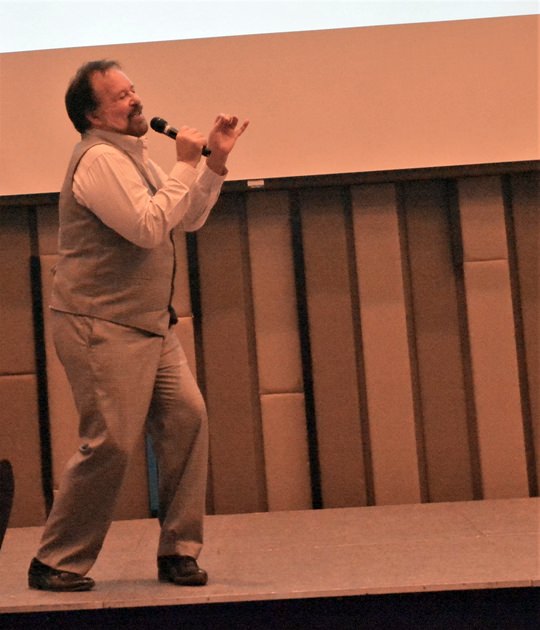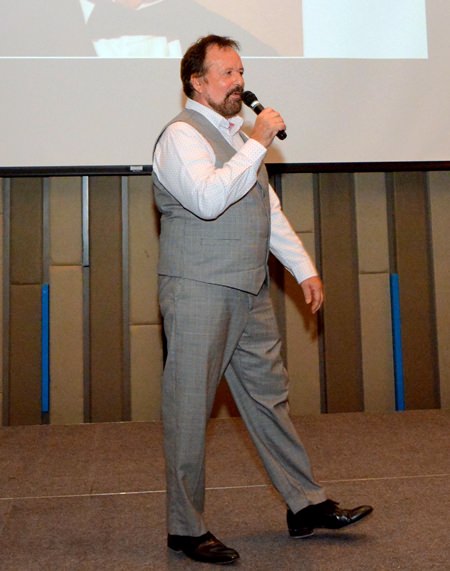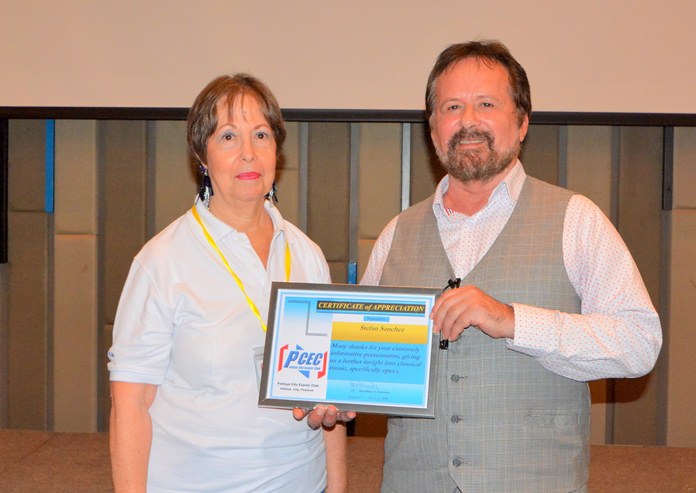
The MC Judith Edmonds opened the meeting and introduced the guest speaker/singer Stefan Sanchez to the assembly. Stefan Sanchez is the current Artistic Director at Grand Opera Thailand.
Stefan started his performance at PCEC by walking amongst the audience singing from Mozart’s The Marriage of Figaro, then Bizet’s Toreador Song – from the opera Carmen. He later sang an aria from Mozart’s opera The Marriage of Figaro.

Stefan elaborated on his background. He was born in America to a Mexican/American father and a Welsh mother. His mother taught him Spanish dances and “Old Time Variety Songs”. When he left school, he went to the Royal Academy of Music in London where he gained distinction, and from where he even started getting job offers before graduating.
After a good start in musicals Stefan settled into opera, recitals and oratorio. He sang up, down and across the country and later with his own companies all over Europe, USA, UAE and South East Asia. However, singing, as much as he loved it, and he was doing rather well at it, was not enough for him – so he formed his first opera company – which in keeping with his usual run of luck went like this: He was singing in Madrid and during a day off found himself in Escorial, a lovely Spanish town. An agent, whom he had met previously was eating in the same restaurant as he was – and asked if he was still fixing concerts. “Yes!” Stefan replied brightly, anticipating a new line of income, and no sooner were the words out of his mouth, then he was off to Ciutadella, the pre-Admiral Nelson capital of Menorca to perform his first opera with his first opera company. After that Stefan quite naturally, circumvented the Globe.
Stefan ran London’s Opera Holland Park and created their resident company. He then went on to run opera and concerts worldwide which took opera to far flung places such as Dubai, Bangkok, Tokyo, Colombo and Pattaya! It was in Bangkok where he met a local music impresario who asked him to sing and direct in Bangkok. He sang Thais (Massenet) and La Boheme (Puccini). He also directed Bluebeard’s Castle (Bartok), Tosca (Puccini), Savitri (Holst) and Mae Naak (Somtow) which they took to the UK. This outing comprised some 100 Thai singers and musicians. Stefan also enabled the YSP (Young Soloists Platform) to help Thai singers take better roles. So here he is seven years later running the Grand Opera Thailand with a group of first class Thai singers!
“Can Anyone Sing?” The answer is yes with certain reservations. Singing requires a free throat, a strong set of respiratory muscles (or if you like a good pair of lungs) and a carefree attitude with respect to the display of emotion. These natural attributes are found in almost every healthy child under the age of six until social conditioning renders them inactive and, in some cases, atrophied. Imagine the new born whose relentless and effortless screams can be heard four blocks away. The voice trainer’s job therefore is to strengthen and free the singing tendency. We are not talking about a technique which is superimposed onto a singing student but rather the unlocking of the voice which may be in some degree lying dormant.
It then follows that an opera singer, musicals singer, jazz or in some cases pop singer can, with training, reach their separate goals of performance excellence and maintain health, strength and beauty of tone well into senior age. The throat is basically made of cartilage, tendons and muscle. The Adams Apple (Thyroid Cartilage) is positioned superior to the Cricoid Cartilage and between them they house the vocal folds or chords which are controlled by the Arytenoid Cartilages. These are two spur like horns that swivel in motion and affect the length and breadth of the chords as well as the space between them called the Glottis.

This glottal variation, as well as the changing shape of the pharynx gives the voice its tonal qualities. They do not work in isolation but in turn are cradled by the “suspensory mechanism” which motivates the throat up, back and down. This elasticity in singing requires the support of the respiratory muscles which are essentially everywhere from the knees up. Respiratory muscles and throat connect somewhat like the precision of a Swiss watch to create the singing tendency. Rhythmic intensity of the diaphragm is essential within this process.

After his presentation, MC Judith Edmonds brought everyone up to date on upcoming events, which was followed by the Open Forum where members and guests can ask questions or make comments about Expat living in Thailand. For more on the PCEC and their activities or to subscribe to their weekly newsletter, visit www.pcec.club.
 |
 |





